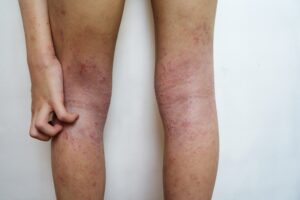Managing a Chronic Condition for Control
Your Eczema Rulebook: Your Clickable Guide to Control
Click on a question to reveal the expert, science-backed answer for your skin health journey.
🔒 The Soak-and-Seal Blueprint (The Goal)
Why is The Soak-and-Seal Method the Most Critical Step?
The goal is to achieve healthy, hydrated skin and consistently repair the skin barrier through hydration and the use of emollients. This approach is the most critical step for barrier repair because a weakened barrier causes dryness and itching.
🚿 Step 1: The Soak (Bathing Rules)
How Long Should I Shower/Bathe, and Can I Use Hot Water?
No, avoid hot water. Bathing should be short (5 minutes or less) and done in cool to lukewarm water. Hot water strips the skin of moisture, which works directly against your goal of barrier repair.
What Cleansers Should I Use?
Use suds-free liquid soaps. Avoid soaps that create suds as they are more drying. Also, always avoid fragrances or strongly scented products.
🧴 Step 2: The Seal (Emollient Application)
What is the Best Technique for Sealing in Moisture?
Immediately after bathing, gently pat the skin dry with a soft towel. While the skin is still damp, apply an emollient cream or ointment. This locks in the moisture absorbed during the bath and prevents evaporation. Emollients are moisturizers used to soften and hydrate the skin, improving barrier function.
🌿 Holistic Management: Triggers & Advanced Care
What Environmental Triggers Should I Avoid?
Minimize contact with irritants like woolens (scratchy clothing), rapid temperature changes, hot water, and household irritants like dryer sheets/scented detergents.
What is the Role of Diet and Advanced Care?
Use suds-free liquid soaps. Avoid soaps that create suds as they are more drying. Also, always avoid fragrances or strongly scented products.
How Do I Safely Do a Bleach Bath?
A bleach bath can help reduce bacterial colonization. The safe instructions are: Add 1/4 to 1/2 cup of regular Clorox bleach (6% sodium hypochlorite strength) to a full tub of water.
Soak for 10-15 minutes, no more than 2-3 times per week.
Ready for Control?
experience self care & build community. let's trust the process together.
Want to see past topics?
You can explore the full Skin 2000 Club archives here.

